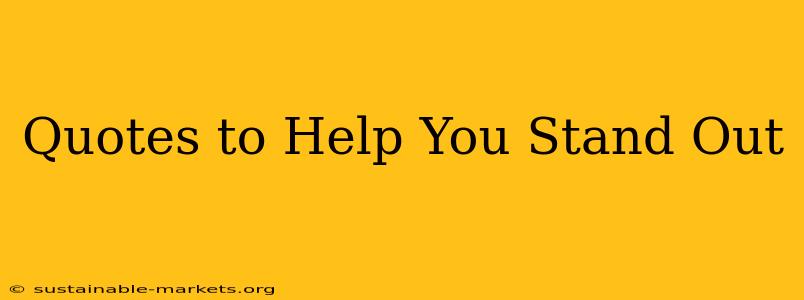In today's competitive world, standing out from the crowd is crucial, whether you're aiming to advance your career, build a successful business, or simply make a lasting impression. One powerful tool often overlooked is the strategic use of quotes. The right quote, at the right time, can encapsulate your values, inspire action, and leave a lasting impact on your audience. This isn't about randomly sprinkling quotes into your presentations or social media; it's about carefully selecting powerful statements that resonate with your personal brand and communicate your unique message.
Why Are Quotes So Effective?
Quotes offer a shortcut to conveying complex ideas and emotions. They're memorable, easily shareable, and lend credibility to your message by associating it with established thinkers or influencers. A well-chosen quote can:
- Strengthen your message: A powerful quote can reinforce your point more effectively than lengthy explanations.
- Enhance your credibility: Quoting respected figures lends authority to your perspective.
- Evoke emotion: Certain quotes resonate deeply with readers on an emotional level, fostering connection and engagement.
- Boost memorability: A compelling quote is far more likely to be remembered than a generic statement.
- Stimulate discussion: Provocative quotes can spark conversation and engagement with your audience.
How to Choose the Right Quotes to Help You Stand Out
The key to using quotes effectively isn't quantity, but quality. Consider these factors when selecting quotes:
- Relevance: Does the quote directly relate to your message or personal brand? Avoid shoehorning quotes that don't fit naturally.
- Authenticity: Does the quote reflect your genuine values and beliefs? Choosing quotes that are incongruent with your brand can damage your credibility.
- Originality: While classic quotes have their place, consider seeking out lesser-known but equally powerful quotes that demonstrate your unique perspective and research.
- Impact: Does the quote evoke a strong emotion or inspire action? A powerful quote should resonate with your audience and leave a lasting impression.
- Attribution: Always cite the source of the quote to maintain credibility and respect intellectual property.
Finding the Perfect Quote: Where to Look
Don't just rely on the same old quotes everyone else uses. Explore diverse sources to find unique and impactful statements:
- Books and Articles: Delve into literature, biographies, and industry-specific publications.
- Podcasts and Interviews: Listen carefully to conversations for insightful quotes and memorable statements.
- Speeches and Presentations: Many inspirational figures have delivered powerful speeches containing quotable moments.
- Social Media: While exercising caution, you can sometimes unearth gems on platforms like Twitter or LinkedIn.
- Your Own Reflections: Don't underestimate the power of your own observations and experiences. Articulating your insights in a concise, memorable way can be incredibly powerful.
How to Use Quotes Effectively
Once you've identified the perfect quotes, use them strategically:
- Context is Key: Introduce the quote with context and explain its relevance to your message.
- Visual Appeal: Use formatting (bolding, italics) to emphasize the quote and make it visually appealing.
- Social Media Optimization: When using quotes on social media, consider adding relevant hashtags to increase visibility.
- Presentation Skills: If using quotes in a speech or presentation, speak with passion and ensure a smooth transition between your words and the quote.
Frequently Asked Questions (FAQs)
What if I can't find a quote that perfectly fits my message?
Don't force it! It's better to use your own words than to shoehorn in an irrelevant quote. Your own authentic voice can be just as powerful.
Can I use quotes from fictional characters?
Yes, as long as the quote is relevant and the character is widely recognized. However, be mindful of the potential for misinterpretation and always provide context.
How many quotes should I use in a single piece of content?
Less is more. One or two well-chosen quotes are often more impactful than a long list.
How do I make sure I'm not plagiarizing when using quotes?
Always cite the source of the quote properly. This includes the author's name and the work from which the quote is taken.
Are there any legal issues I should be aware of when using quotes?
Generally, quoting short passages for commentary or criticism is protected under fair use. However, using extensive quotes or using them for commercial purposes could lead to copyright infringement. Always err on the side of caution and seek legal counsel if you have any concerns.
By thoughtfully selecting and strategically using quotes, you can significantly enhance your personal brand, leave a lasting impression, and truly stand out from the crowd. Remember, authenticity and relevance are key. Let your words and the words you choose to share reflect the unique individual you are.

